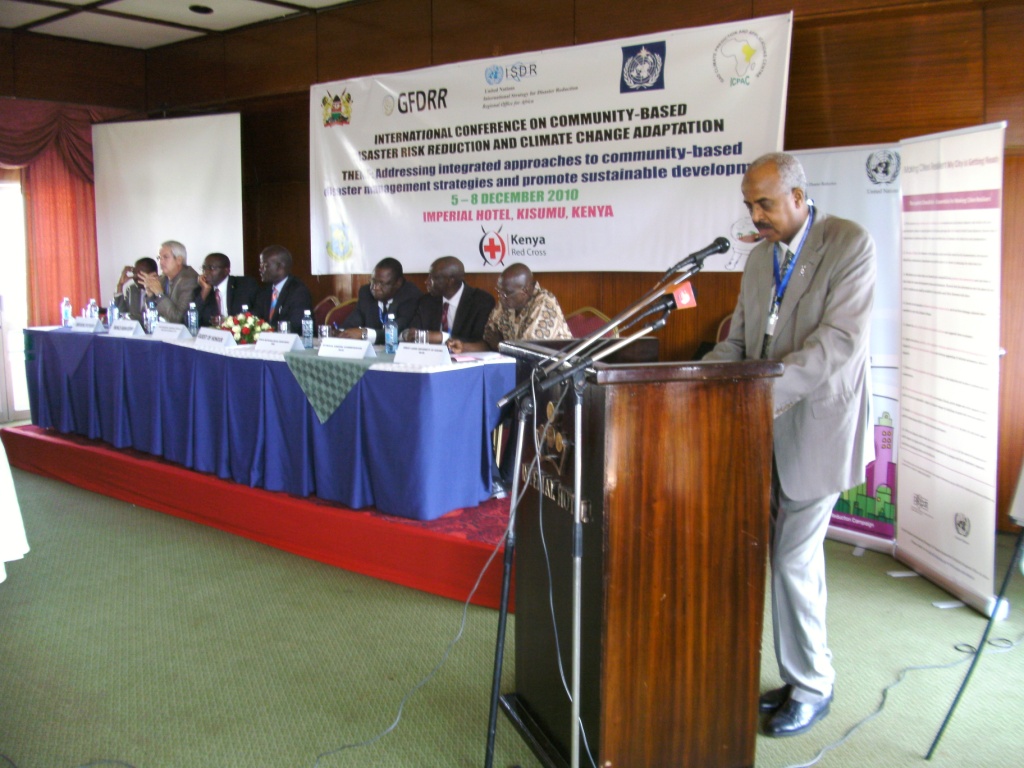By Dickens Wasonga.
The member states of the African Union have been asked to ensure Africa’s regional strategy on disaster risk reduction endorsed at a ministerial meeting early this year in Nairobi is fully implemented in the next three years.
Speaking during the official opening of an International Conference on Community based disaster risk reduction and Climate change adaptation in Kisumu City, Mr Almami Dampha of the African Union’s Commission on Environment and Natural Resources said most developing countries still lack the capacity in terms of institutions at the country levels that would help in reducing the risk of disasters,hence the need to fully adopt and implement the strategy.
Mr Dampha pointed out that although the AU was fully committed to ensuring resources are mobilized and partnerships with various donor agencies are built to help boost the capacity of the members sates in terms of disaster risk reduction , it is up to such countries and their communities to be more prepared to mitigate disasters arising mainly from climate change.
He said this can only be possible if such countries and their communities have timely and relevant information of predictions about the impending disasters before they struck adding that climate change has further complicated disaster management agenda in Africa.
Dampha advised African governments to strive to strengthen capacities of such institutions where they already exists to be able to accurately predict disasters and give early warnings so that communities can easily develop management and coping mechanisms.
He a observed that coordination,information sharing and dissemination was also a great challenge for most countries as resources mobilized by different organizations at the country level are not put together.
”We have realized that most countries lack capacities in terms of institutions,awareness creation, information sharing and dissemination is poor while coordination is almost lacking. There are a lot of players but no body knows what others are also implementing.We therefore recommend that these resources be put together for ease of coordination” he said.
The three days conference aims to address integrated approaches to community- based disaster management strategies and promote sustainable development.
It is also expected to discuss challenges associated with capacity development that would ensure effective strategies for coping with climate variability and adaptation of vulnerable communities to climate change.
Addressing participants at the same function , the Kenya Red Cross Society Secretary General Abbas Gullet said the issues of Disaster Risk Reduction{DRR} in the country is taken seriously at sectoral levels.
The Kenya Red Cross Society Secretary General Abbas Gullet addressing the participants at the Kisumu conference. He also officially opened the three day workshop.
He hinted that the government in partnership with various organizations like the Red Cross has developed a number of policies to address challenges emanating from Disaster Risk Reduction in the East African Nation which was hit by terrorists whom bombed the country’s capital in 1998.
Kenya’s response to disaster was put to test when fire gutted the Down town branch of the Nakumatt holdings in Narobi which saw several people lose their lives and scores injured. The Elnino phenomenon of the 1998 also impacted negatively on the country’s economy.
Like in most developing countries, Kenya’s agricultural activities have been disrupted in the past leading to destruction of crops ,death of livestock and several families being displaced due to floods.
Communities mainly from the Northern part of the country for example, who keep livestock have also been the worst hit during dry spell like Elnina.
In the words of the Red Cross boss such disasters 90 per cent of which are natural and weather and climate related have led to food scarcity, out brake of diseases and loss of many lives in the country.
Mr. Gullet added that the government and other major stakeholders in the DRR program are working together in addressing the challenges even at the community levels in the entire country.
The Director of Kenya Meteorological Department Dr. Joseph Mukabana said climate change is very serious at community level because of vulnerability.
The conference which has been organized by IGAD Climate Prediction and Applications Center {ICPAC] will provide a forum for exchange of knowledge and information among indigenous communities,policy makers and scientists on disaster risk reduction from all over Africa.
ENDS


What “disaster” are the brains behind this conference talking about?
Are they preparing for some man-made disaster, like the one created in CONGO?
implement all toos and measures to protect community against disaster.
yes,after end conference,iam ready to toalk about disaster and preparing to protect.